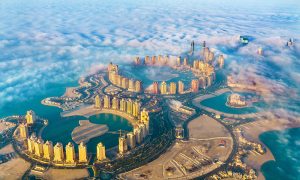Qatar commercial vehicle dealers report mixed outlook for 2016
Infrastructure projects seen driving demand, but tough year expected

Qatari commercial vehicle dealers have a mixed outlook for the year ahead, with infrastructure projects around the FIFA World Cup 2022 expected to drive demand, despite the low oil prices.
Heavy vehicle suppliers largely reported strong growth last year in truck sales, with steady demand from the construction and infrastructure segments.
“2015 was a very successful year, as we managed to increase our market share significantly compared to the previous year’s numbers and figures,” said Iyad Jaradat, GM at Qatar International Automobiles, the dealer for MAN Truck & Bus.
The company secured major orders last year, and was able to increase sales growth by widening its customer base.
Last year was also positive for Domasco, the Qatari distributor for Volvo Trucks, said Mohammed Abdul Majeed, sales and marketing manager for commercial vehicles. “For Volvo Trucks, it was a very good year. We recorded 300% growth in 2015 compared to 2014, and 70% of our customers were new deals.”
Although 2015 was a good year for business across the board, reactions were mixed when dealers were asked about expectations for the year ahead.
“2016 will be a different year. In the days to come, we will know the full extent of the global economic situation, but 2016 will surely not be like 2015,” Jaradat says.
Arun D’souza, general manager at Ibn Ajayan Trading Group, the dealer for Iveco in Qatar, is optimistic about 2016 and expects infrastructure projects to proceed full steam ahead. “Compared to all the other GCC countries, Qatar is still better positioned because of the infrastructure projects for 2022, so this will keep pushing the market.”
In addition, the country’s efforts towards economic diversification are giving a boost to industries like tourism, which combined with public spending on infrastructure projects should keep momentum going, he told MEConstructionNews.com.
The other dealers interviewed were not as positive about the year ahead. “It will be tough. Like most of the GCC countries, we have the drop in oil prices which really caused a shrink in the spending,” said Ayman Ahmed, managing director at Jaidah Heavy Equipment, the dealer for Isuzu commercial vehicles and UD Trucks.
However, like D’souza, he too is confident that infrastructure spending will continue, and business in Qatar therefore will be the least affected by low oil prices. “The government is still committed to spend a lot of money on the infrastructure and World Cup projects, because it will be difficult to postpone this. But, of course, like any other country in the GCC it will be looking at cutting expenses, and due to that the demand will be a bit less than last year.”
With fewer trucks being sold, competition no doubt will grow fiercer. “This is where suppliers need to be creative and have initiatives in the market to maintain market share at the same level,” Ahmed said.
Majeed also expects the market in Qatar to slow down this year, but not drastically. However, he expects many projects to be delayed or extended, he said.
As times get tough, ensuring a strong after-sales offering will be even more crucial, Ahmed noted. Accordingly, Jaidah Heavy Equipment is building a new service facility for Isuzu in Qatar’s industrial area. Construction on the facility will start this year, he said.
Anticipating uncertainty among construction industry customers, companies like Domasco are actively trying to tap into different industry segments. If sales are sluggish amongst construction sector customers, the Volvo Trucks dealer will be looking towards waste management and ready-mix applications, Majeed said.
“Even if the market is slow, waste management is not going to stop. The country is expanding so waste management trucks are needed on the roads.”
The ready-mix segment is also potentially lucrative, given that many of the construction and infrastructure projects underway are in their initial stages. “We are looking at opportunities in these two segments, if not construction. Construction is our major segment, but if it is slow, then we can divert ourselves to these two segments.”

























